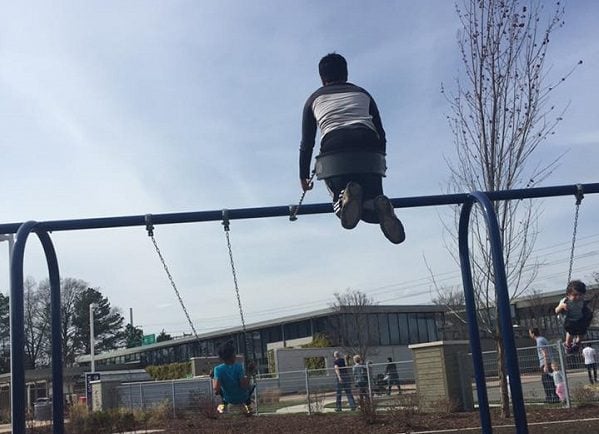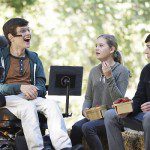This is Day Six of the Ali Family #AutismTruths – April 6, 2017
Dear Folks,
The world sure looks at you different when you are a teenager, young adult or adult with autism. Whether you are autistic in a vein similar to D or autistic in a myriad of other manifestations – it’s just a different reaction.
I posted this today on Facebook:
D and I stopped at our fave halal meat/ethnic grocery store on our way home – there were a bunch of desi [South Asian] folks in there I didn’t recognize. It’s a small store with narrow aisles, and D is rather a harmless bull in a china shop.
He put his cheery face up close to a lady, making his typical D friendly noses. She totally flinched big time, gasped and bent backwards away from him — very much freaked by his invasion of her personal space. I was right behind him when it happened.
To her credit, she recovered herself quickly as I apologized on his behalf. But let me tell you – autism in the teenage years when you are taller than your mom and way past getting away with the cute, little, well-that-kid-looks-rambunctious-stage is a whole other ball game.
There’s #AutismAwareness for you.
When D was diagnosed at the age of three and began attending a special autism school in downtown Manhattan soon after, I was told of a series of parent workshops that the school was holding to help families new to the diagnosis learn about autism, terminology, treatments and the parental experience.
I eagerly signed us all up – myself, my husband and my in-laws, who were visiting with us at the time. No one was very eager to go other than myself. I think they were in that stage where they were thinking this was something that D was going to outgrow. He would go to school, get the right therapies and this would all be over soon.
Uh huh, that’s not how things really worked out.
I only remember a few things from those workshops, one of which is etched in my and my husband’s memories: No stigmata.
That’s what the instructor said – autism has no stigmata. No “look” or physical feature that differentiates a child or person as autistic.
For months, years even, we would look at photos of D as he grew up and marvel at how beautiful and handsome he was/is. No stigmata, we’d whisper to each other.
Indeed, for many years we could go out in the community or to a party or social event and in their busyness, people wouldn’t see right away that something was different about D. For sure he exhibited stereopathic behavior, didn’t speak to people and had other tell-tale markers (well, they were glaringly tell-tale to me). But in a group of kids, he also could more or less blend into the rambunctiousness.
No one would really notice that he was off in the corner rolling a toy car back and forth, or thumbing through a favorite book in a particular order over and over, or building tall towers of blocks only to break them down and build the same single line of tower again. Over and over and over.
Him coming with me into the women’s bathroom was no big deal. All little boys came with their moms to the women’s bathroom.
Now, however, it’s a whole different ball game.
D stands out now. Whether we are searching for a family restroom or walking through the aisles of Target or playing on the swings at the park – he gets noticed all the time. He’s a young man approaching the age of 17, taller than me with a sprouting mustache and beard.
No stigmata, yes. But also, no.
I don’t mind the stares anymore. I understand, really. At first glance, it looks odd to you. If I were a different person with a different life and different children, I would probably do a quick first look too. So that’s ok. I get it.
It’s the second stare or ongoing stare, whispers to your spouse or friend or look you give me that I have a problem with. It still doesn’t bother me per se. It takes a hell of a lot to bother D and I and even his siblings now. We’ve pretty much seen it all from the public. And, if you take all the autistic gloriousness that is D and pair it with me in all my hijab gloriousness, then you can imagine that we’ve been looked at and asked pretty much everything by now.
So just a word of advice – autistic kids grow up to be autistic teens who grow up to be autistic adults. They are all around you. On behalf of D, I’m sorry if he gets in your personal space or suddenly comes and gives you a bro hug. He’s an affectionate dude of late. I know it’s improper, but he means no harm and is living a rather unfiltered life. I’m sorry if he gets upset and it comes across rather scary. We are trying our best to live our lives fully while respecting your space and rights as well.
Cut him, cut us, some slack please.
Sincerely,
Dilshad













